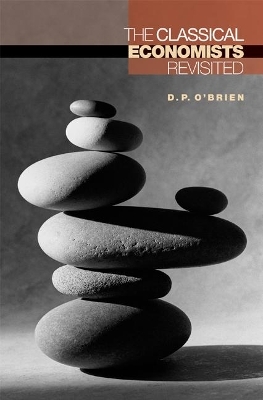
The Classical Economists Revisited
Princeton University Press (Verlag)
978-0-691-17798-4 (ISBN)
A seminal contribution to the field, this book will be treasured for many years to come by economists, historians of economics, instructors and their students, and anyone interested in the sweeping breadth and enduring influence of the classical economists.
D. P. O'Brien, Professor Emeritus of Economics at the University of Durham, is the author or editor of many books, including J. R. McCulloch and Thomas Joplin and Classical Macroeconomics.
Preface to the Second Edition xi Preface to the Original Edition xiii Introduction xv Chapter One: The Classical Economic Stage 1 I. The Period of Classical Economics 1 II. The Personnel of Classical Economics 3 III. The Backgrounds of the Classical Economists 9 IV. A Scientific Community? 12 V. The Economic History of the Classical Age 17 Further Reading 19 Chapter Two: The Roots of Classical Economics 26 I. Introduction 26 II. The Intellectual Environment 26 III. Adam Smith 35 IV. David Ricardo 44 V. The Later Classical Economists 52 Further Reading 56 Chapter Three: The Characteristics and Preconceptions of Classical Economics 63 I. The Focus of Classical Economics 63 II. Population 66 III. The Method of Classical Economics 79 Further Reading 87 Chapter Four: Classical Value Theory 91 I. Adam Smith 91 II. David Ricardo 98 III. "Cost-of-Production" Theories of Value after Ricardo 106 IV. The Subjective Value Theorists 114 1. J. B. Say 114 2. N. W. Senior 116 3. M. Longfield 119 4. W. F. Lloyd 122 5. Other Writers 122 V. Conclusion 123 Further Reading 124 Chapter Five: The Classical Theory of Distribution 127 I. Wages 127 II. Profits 137 III. Rent 145 IV. Relative Shares 153 V. Conclusion 161 Further Reading 161 Chapter Six: Classical Monetary Theory 165 I. The Historical Background 165 II. The Nature of Money 166 III. The Basic Theory 169 IV. The Bullion Debate 175 V. Monetary Control: The Bank Charter Debate 181 VI. A Fundamental Flaw? 191 VII. Inflation 194 VIII. Conclusion 198 Further Reading 198 Chapter Seven: International Trade 205 I. Absolute Advantage: Trade and Growth 205 II. Comparative Advantage 208 III. Reciprocal Demand 219 IV. The Terms of Trade 227 V. Trade Policy 228 1. Robert Torrens and the Cuba Case 230 2. Torrens and His Critics 233 3. Further Problems 238 VI. Customs Unions 239 VII. The Transfer Problem 239 1. Transfer Mechanisms 240 2. Classical Transfers 242 VIII. Conclusion 243 Further Reading 244 Chapter Eight: The Classical Theory of Growth and Development 248 I. The Smithian Growth Process 249 II. The Classical Vision of Growth after Smith 259 1. T. R. Malthus 259 2. J. R. McCulloch 260 3. J. S. Mill 263 III. Machinery and Gluts 269 1. The Machinery Question 269 2. Capital Accumulation and Gluts 274 IV. Productive and Unproductive Labor 278 V. Conclusion 281 Further Reading 282 Chapter Nine: Classical Public Finance 288 I. General Principles of Public Finance 288 II. Tax Finance 294 1. Direct Taxes 296 2. Indirect Taxes 308 III. National Debt 312 IV. Conclusion 319 Appendix: Net Present Value Taxation 320 Further Reading 322 Chapter Ten: The Policy Prescriptions of Classical Economics 327 I. The Legitimate Role of Government 327 II. Detailed Treatments of Intervention: The Domestic Economy 334 1. The Factory Acts 334 2. Mechanization 336 3. Pauperism 337 4. Education 339 5. Trade Unions 341 III. Policy for Ireland 342 IV. Colonies and Colonial Policy 345 V. Conclusion 349 Further Reading 350 Chapter Eleven: Classical Economics: A Retrospect 356 Notes 363 Index 405
| Erscheinungsdatum | 29.01.2018 |
|---|---|
| Verlagsort | New Jersey |
| Sprache | englisch |
| Maße | 152 x 235 mm |
| Themenwelt | Geschichte ► Teilgebiete der Geschichte ► Wirtschaftsgeschichte |
| Wirtschaft ► Allgemeines / Lexika | |
| Wirtschaft ► Volkswirtschaftslehre ► Finanzwissenschaft | |
| ISBN-10 | 0-691-17798-8 / 0691177988 |
| ISBN-13 | 978-0-691-17798-4 / 9780691177984 |
| Zustand | Neuware |
| Haben Sie eine Frage zum Produkt? |
aus dem Bereich


